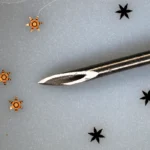Dingchang Lin Named Packard Fellow
Materials scientist Dingchang Lin has been awarded a 2024 Packard Fellowship for Science and Engineering, a prestigious award that provides the nation’s most promising early-career scientists and engineers with flexible funding and the freedom to take risks and explore new frontiers in their fields of study. This year’s class of 20 fellows will each receive grants of $875,000 over five years.
Since its founding in 1988, the David and Lucile Packard Foundation has awarded fellowships to 19 scientists and engineers (including this year’s honorees) affiliated with Johns Hopkins. Of those 19 fellowships, seven were awarded in the past five years.
Packard Fellowships support visionary work by providing unrestricted funds that can be used in any way the recipients choose, including paying for necessities like child care. This latitude gives fellows the opportunity to experiment and lead cutting-edge research which has led to critical advancements that impact daily life.
Dingchang Lin is an assistant professor in the Department of Materials Science and Engineering in the Whiting School of Engineering and core researcher at the Institute for NanoBioTechnology. In Lin’s field, one of the ultimate aspirations is to map the dynamics of all cells of interest within an intact organ or organism in space and time, a goal that has yet to be achieved. He hopes to fulfill this ambition through a new sensing modality that records the activity history in individual cells for endpoint readout. Cells continuously respond to internal and external cues through intricate, coordinated, and dynamic signaling networks. Understanding these networks is essential for unraveling the mechanisms underlying health and disease. His lab harnesses advances in materials science, synthetic biology, and protein engineering to develop tools that spatiotemporally map cellular activities in living animals.
By leveraging in cellulo protein assemblies as molecular memory, his team will develop intracellular recording platforms that are genetically encodable, orthogonal to cell processes, generalizable for mapping diverse cellular events, and applicable for in vivo recording. He will also create computational methods to retrieve recorded signals at high throughput, generating spatiotemporal maps of cell dynamics throughout the entire organ.
Lin received his bachelor’s degree in materials science and engineering from Tsinghua University in China in 2013 and completed his PhD in materials science and engineering at Stanford University in 2018. He received his postdoctoral training in chemistry and chemical biology at Harvard University. Lin has received many awards, including the a Department of Defense Air Force Office of Scientific Research (AFOSR) Young Investigator Program (YIP) Award (2022), NIH NIGMS MIRA Award (2022), the Harvard Brain Institute Young Scientist Transitions Award (2021), MRS Graduate Student Award (2018), and Ross N. Tucker Memorial Award (2017). Lin has been recognized as the Web of Science (Clarivate) Highly Cited Researcher since 2019.
Read the full story by the Hub.





